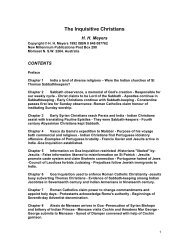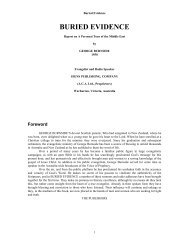Battle of the Bibles - Present Truth
Battle of the Bibles - Present Truth
Battle of the Bibles - Present Truth
Create successful ePaper yourself
Turn your PDF publications into a flip-book with our unique Google optimized e-Paper software.
Chapter Twenty-One<br />
The Bible Societies<br />
On March 7, 1804 thirty-six Protestants assembled in London and formed <strong>the</strong><br />
British and Foreign Bible Society. Fifteen <strong>of</strong> its members were Anglicans, fifteen were <strong>of</strong><br />
o<strong>the</strong>r Christian communions and six were Christian foreigners who were resident close<br />
to London.<br />
At <strong>the</strong> first annual meeting it was realised that an amendment to Article one <strong>of</strong><br />
<strong>the</strong>ir constitution was necessary. This was because <strong>the</strong> founding members had taken it<br />
for granted that <strong>the</strong>re was only one genuine English-language Bible. The amendment<br />
now removed any doubt about <strong>the</strong> founders' intention for <strong>the</strong> Society by adding:<br />
"The only copies in <strong>the</strong> language <strong>of</strong> <strong>the</strong> United Kingdom to be circulated by <strong>the</strong><br />
Society shall be <strong>the</strong> Authorised Version [King James Bible] without note or comment"<br />
(Canton, "The History <strong>of</strong> <strong>the</strong> British and Foreign Bible Society", 1904, Vol. I p 17).<br />
Canton comments on Protestant philosophy behind this amendment:<br />
"It echoed <strong>the</strong> cry <strong>of</strong> <strong>the</strong> martyr-Church <strong>of</strong> <strong>the</strong> Waldenses, 'The Bible whole and<br />
alone "' (ibid).<br />
As <strong>the</strong> Society's work moved into Europe, especially into countries where <strong>the</strong><br />
Reformation had been subverted by Romanising "Protestants", <strong>the</strong>re was considerable<br />
agitation to have <strong>the</strong> Society bring out <strong>Bibles</strong> which contained extracanonical material<br />
such as <strong>the</strong> Apocrypha.<br />
Accordingly, <strong>the</strong> British and Foreign Bible Society allowed its foreign societies<br />
discriminatory powers, providing no notes or comments were used (ibid p 335).<br />
It seems that such permission to print <strong>the</strong> Apocrypha was aimed at keeping<br />
European patronage, but <strong>the</strong> change was brought about without <strong>the</strong> knowledge <strong>of</strong> o<strong>the</strong>r<br />
British supporters. When it was discovered that <strong>the</strong>ir money was being used to fur<strong>the</strong>r<br />
<strong>the</strong> Roman cause <strong>the</strong>re was trouble.<br />
On December 20, 1824 <strong>the</strong> Society's Committee sought to clarify <strong>the</strong> situation by<br />
refusing any funding <strong>of</strong> spurious Scriptures. A resolution was passed which stated:<br />
"That no pecuniary grant be made by <strong>the</strong> Committee <strong>of</strong> this Society for <strong>the</strong><br />
purpose <strong>of</strong> aiding <strong>the</strong> printing or publishing any edition <strong>of</strong> <strong>the</strong> Bible, in which <strong>the</strong><br />
Apocrypha shall be mixed and interspersed with Canonical Books <strong>of</strong> Holy Scriptures"<br />
(ibid p 337).<br />
Much controversy and dissatisfaction arose among some <strong>of</strong> <strong>the</strong> European<br />
Societies, but <strong>the</strong> parent Society made a fresh resolve to keep its hands clean <strong>of</strong> Roman<br />
contamination and in 1826 <strong>the</strong> resolution became law (ibid). Again in 1839 <strong>the</strong> Society<br />
found it necessary to pass a resolution, this time refusing to recognise <strong>Bibles</strong> derived<br />
from <strong>the</strong> Roman Vulgate as <strong>the</strong> Word <strong>of</strong> God. But those who favoured Roman <strong>Bibles</strong><br />
were persistent and again in 1856 and 1857 <strong>the</strong> Society emphatically refused <strong>the</strong><br />
distribution <strong>of</strong> <strong>Bibles</strong> based on <strong>the</strong> Vulgate, saying that <strong>the</strong>y were in <strong>the</strong> business <strong>of</strong><br />
promoting <strong>the</strong> King James Version (ibid p 63).<br />
Ano<strong>the</strong>r controversy had also arisen quite early in <strong>the</strong> Society's history and this<br />
dealt with Unitarianism. Problems had arisen over <strong>the</strong> apparent reluctance <strong>of</strong> some to<br />
open <strong>the</strong> Society's meetings with prayer, <strong>the</strong> reason being, that if prayer to God was<br />
<strong>of</strong>fered in <strong>the</strong> name <strong>of</strong> Jesus Christ, <strong>the</strong> few Unitarians belonging to <strong>the</strong> Society would<br />
take <strong>of</strong>fence. After much discussion in which it was unsuccessfully urged that <strong>the</strong><br />
Society and all its members subscribe to <strong>the</strong> doctrine <strong>of</strong> <strong>the</strong> Trinity, a break away Society<br />
9





